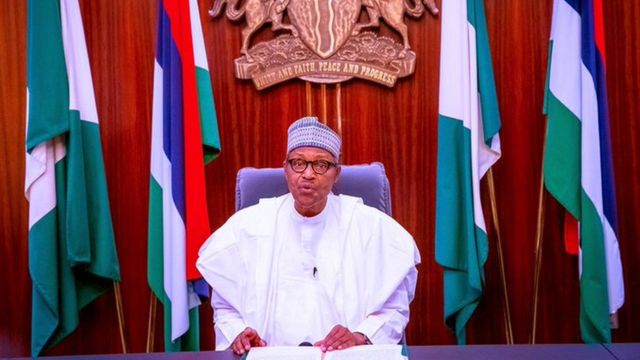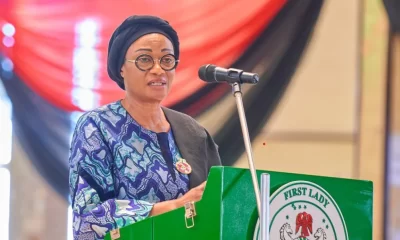Latest
X-raying Buhari’s scorecard eight years after
Published
3 years agoon

As the Muhammadu Buhari administration’s eight-year tenure draws to an end on May 29, 2023, Nigerians have continued to ask questions on how they fared in tackling corruption and insecurity as well as in improving the economy bearing in mind that it is one thing to make promises and another thing to fulfil the promises.
Speaking on the three priorities of his administration at a function recently, President Muhammadu Buhari insisted that they had made an impact on security, the economy, and the anti-corruption war.
He said, “As you are all aware, this administration came to office determined to make an impact in three main areas: security, building a sustainable economy, and fighting against corruption.
“In the area of corruption, as you are all aware, I am determined to ensure that we do not have a repeat of what has gone on in previous administrations and we have taken a strong stand against pervasive corruption.
“This administration has also focused on security by repositioning our national security to perform their duties effectively. We have equally embarked on some crucial changes in their funding, structure, and modes of operation.
READ ALSO: Galadima accuses Buhari of ‘destruction of politics of principle’
Prior to the 2015 general elections activities of the terror group like Boko Haram, which was seeking to impose Islamic Law on Nigeria, was at their peak.
Reports indicate that over 13,000 Nigerians were killed, just as businesses and property worth billions of naira were also destroyed. This is as militancy, banditry, and other violent crimes were thriving.
Over 18,000 Nigerians were also reported to have been displaced and thousands were held captive by Boko Haram and other criminals, just as towns in the North-west were taken over by the insurgents.
Security and military personnel were demoralised and killed on a daily basis as a result of poor equipment and lack of synergy.
The situation was so bad that Nigeria was rated 151 out of 162 in the global peace index and number four in the world’s most terrorised nations in other words global terrorism index (GTI).
READ ALSO: Buhari to inaugurate new world class facility to boost nation’s health sector
Speaking on the achievements and shortcomings of the outgoing administration, a security expert and Managing Director, Beacon Consulting Limited, Kabir Adam, said there was an improvement in security, however, there was a lot that the administration needed to have done.
He said, “Clearly, both the executive and the legislative arms of government have prioritised security. Now, as a result of that prioritisation several things were achieved, the most prominent of which is the increase in the number of security personnel, even though the stated objective was not met.
“The most significant achievement, I think, given the area of hardware that was purchased for almost all the security organisations, both the military and the police, we’ve seen an increase in the number of platforms and weaponry and other equipment that is at their disposal for various elements of their work that they do.
“You can argue that their capacity has reduced and that the situation in the North-east has improved to a point that even international organisations like the Global Terrorism Index (GTI) have reflected that improvement. However, sadly, we have seen a southward movement of big groups into places like Kaduna, parts of Katsina state, and Niger state. So yeah, to that extent, I would say there is an improvement.
Identifying areas where the Buhari/Osinbajo falls short the security analyst said, “Despite all of these things I’ve mentioned, there are still incremental challenges. Number one is the inability to address the desire of Nigerians to see the decentralisation of security. Most Nigerians are desirous to see decentralised security, but the Buhari administration could not address that.
READ ALSO: Buhari administration has divided our people on basis of ethnicity, religion, region – Bishop Kukah
Speaking on how the administration fared in the area of economy a political economist Adefolarin Olamilekan and an economic expert, Friday Efih, said during Buhari’s eight-year-tenure the economy had gone from good to bad, then worse.
The analysts said despite the huge resources invested in agriculture, and the increase in revenue generation, the Buhari/Osinbajo administration could not salvage the state of the economy as many Nigerians expected.
Olamilekan, who noted that under their watch fiscal and monetary policies work at cross purposes, said the administration deserved commendation, especially for fostering a tight nose on government revenues, during the period of escaping three economic recessions.
He lambasted the administration for leaving over 133 million dimensional poor Nigerians behind, after promising to reduce the poverty index.
According to him, “With double-digit inflationary pressure of 21.89 per cent, staggeringly unemployment 36 per cent and 18 per cent interest rate and the huge gaps created in the housing sector, as well as the conditions of deplorable roads this administration failed to salvage the economy.”
On how the Buhari-led administration fared in the fight against corruption Olamilekan said: “The government tried much to arrest the monster called corruption, but failed to internalise the fight against corruption from top to bottom.”
READ ALSO: National conference urges Buhari to protect anti-corruption legacy
According to him, “Because they failed to maximise the anti-corruption crusades amongst the political class and top public servants, there was no meaningful result achieved in stopping corrupt practices in our public procurement process.
“Thereby creating huge gaps for wastage of government resources and misdirection of policy action, ” he added.
Trending

 Entertainment6 days ago
Entertainment6 days agoSinger Simi faces backlash after TikToker admits to false rape allegation

 Entertainment3 days ago
Entertainment3 days agoSimi addresses resurfaced 2012 tweets amid online backlash

 Comments and Issues6 days ago
Comments and Issues6 days agoNigeria’s Declining Oil Output and Soaring Foreign Portfolio Investment Inflow

 Business7 days ago
Business7 days agoPENGASSAN warns Tinubu’s executive order on oil revenues could jeopardise 4,000 jobs

 Comments and Issues6 days ago
Comments and Issues6 days agoEx-prince Andrew’s arrest, lessons for Nigeria

 Health1 week ago
Health1 week agoNanoplastics may disrupt brain cells that control puberty, fertility, study finds

 Editorial Opinion1 week ago
Editorial Opinion1 week agoFirst Lady, Senator Oluremi Tinubu: A call to purpose beyond symbolism

 Comments and Issues6 days ago
Comments and Issues6 days agoThe Seyi Tinubu’s jellof rice, loaves of bread

